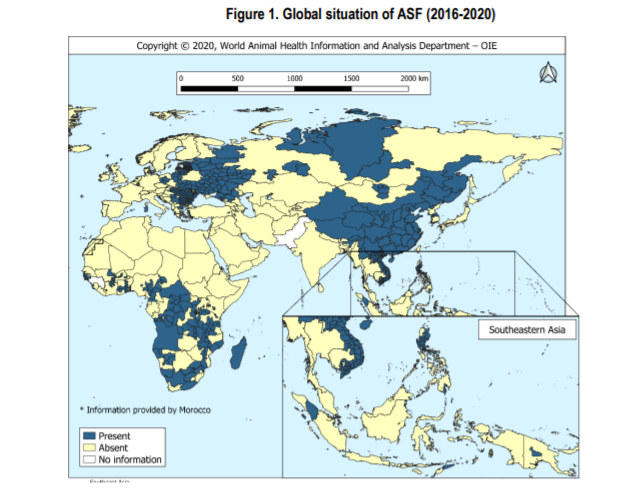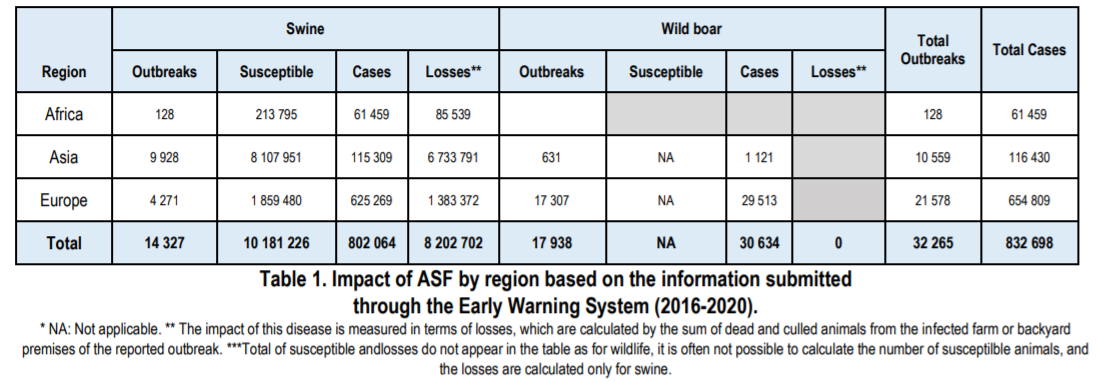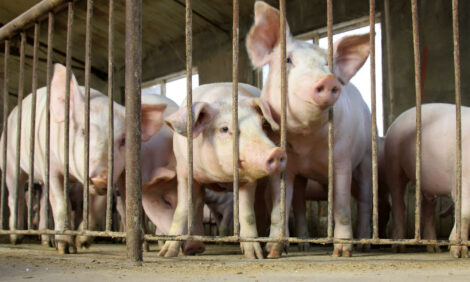



OIE Report: Global situation of African Swine Fever
The OIE outlines a historical view of country outbreaks since 2016, shows where African swine fever (ASF) is currently active and explains ways to fight this devastating transboundary animal disease.This report presents an historical overview on the situation of African swine fever (ASF). The ASF events reported to the OIE by its Members through the World Animal Health Information System, WAHIS from 2016 to 2020 (up to June 18) were included; as since 2016, a pattern of significant increase in the amount of outbreaks was identified. The disease is present in the African, European, and Asian region. In this period, 30% (60/201) of the reporting countries and territories have reported the disease as present. In Europe, many countries reported the first occurrence of the disease since 2016. Moldova notified the disease as present in September 2016, then Czech Republic in June 2017, followed by Romania in July 2017, Hungary in April 2018, Bulgaria in August 2018, the recurrence of the disease was reported by Belgium in September 2018 (last event occurred in 1985), Slovakia reported the first occurrence of the disease in July 2019, and most recently, Serbia in January 2020 and Greece in February 2020. In Asia and the Pacific, China People’s Republic of) notified the presence of the disease for the first time in August 2018, Mongolia in January 2019, then Vietnam in February 2019, Cambodia in March 2019, Hong Kong (SAR-PRC) in May 2019, Korea (Dem. People’s Rep.) in May 2019, Laos in June 2019, Myanmar in August 2019, Philippines in July, 2019, Korea (Rep. of) in September 2019, Timor-Leste in September 2019, Indonesia in November 2019, and more recently, Papua New Guinea in March, 2020 and India in May 2020.The distribution of the disease since 2016 is illustrated in Figure 1. The disease is endemic in most South-Saharan African countries. The complete list of countries affected can be found in the foot note.


The global impact of ASF by region is displayed in Table 1. Europe accounted for 67% of the outbreaks reported through immediate notifications and follow-up reports. However, the highest impact in terms of animal losses was reported in Asia (6 733 791 animals lost, which is 82 % of the total global reported losses). Important regional differences are observed at Regional level. African countries reported outbreaks only in swine, Asia mainly in swine, while Europe mainly in wildboar. This data corresponds to very different epidemiological
situation.


Conclusion
The global pattern of distribution of ASF in this period reveals a serious deterioration due to the spread of the disease, mainly in Europe,
and in Asia, after the first occurrence in China (People’s Republic of) in 2018. In this context, the work of GF-TADs2 Global Steering Committee in empowering regional alliances in the fight against transboundary animal diseases (TADs), in providing capacity building and in assisting the countries to establish programmes for the prevention, preparedness and control, is of pivotal importance for the control and eradication of the disease at global level. Members are reminded that the OIE Terrestrial Animal Health Code provides comprehensive guidance to veterinary authorities for establishing a country, zone and compartment free of ASF as well as recommendations relating to the trade of pork and pork products. These products, when handled in accordance with hygienic practices complying with international standards, are not a source of infection. The OIE also encourages Members to implement enhanced national sanitary measures on waste disposal from aircrafts/vessels/passengers and enhanced in-farm biosecurity measures – including the protection of pigs from untreated swill feeding and the effective separation between domestic pigs and wild boar – and stresses the importance of OIE international standards for risk management of transboundary animal diseases (TADs) to reduce the risk of exporting disease to trading partners.







